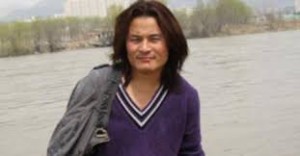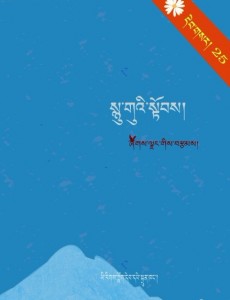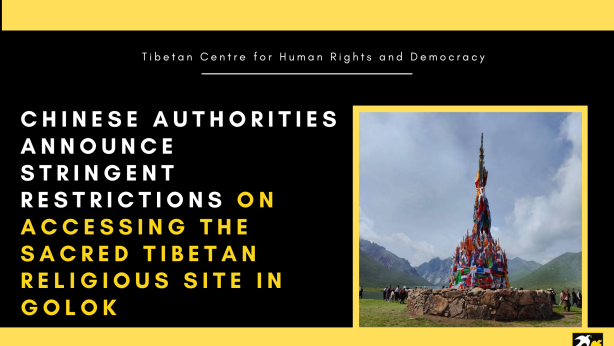TCHRD condemns arbitrary detention of Tibetan writer Shokjang

Early this month, exile Tibetan media organizations reported the detention of Tibetan writer Shokjang aka Druk-lo in March this year. Shokjang’s detention was later confirmed when a Tibetan blogger named Jangda from Amdo shared a post on WeChat calling on the release of his writer friend: “My friend [Shok-jang] has not committed crime, bring him back.” According to information received by TCHRD, Shokjang was arrested on 19 March 2015, days after the 56th anniversary of the 10 March Tibetan National Uprising Day of 1959.
Shokjang was arrested for sharing the following report with the outside world:
Gun-toting soldiers have surrounded Rebkong. They are frisking the Tibetans. Is this meant to protect public security? Or is this a deliberate ploy to provoke the people? If this is how they create the so-called social stability, how extremely terrifying this act is!
TCHRD strongly condemns the incommunicado detention of Shokjang as this is direct attack on his right to freedom of expression and opinion. Both international and Chinese law provide for the right to freedom of expression. Therefore, by peacefully expressing his opinions and insights on the repression and violence suffered by Tibetans under Chinese rule, Shok-jang did not break any law. Given the repeated rhetoric by the Chinese president Xi Jinping on upholding ‘rule of law’, Shok-jang’s arbitrary detention is the latest in the series of actions taken by the local Chinese authorities in Tibet that exposes the hollowness of ‘rule of law’ claims. So far there are no known formal charges filed against the writer, as is the norm in Tibet; Tibetans are routinely subjected to arbitrary detentions without the police furnishing any kind of formal documents authorizing detentions or arrests. TCHRD calls on the Chinese authorities to put an immediate end to criminalizing Tibetans writers and intellectuals for non-violently exercising their right to freedom of expression and opinion.

This is not the first time that the Chinese police detained Shok-jang. According to Theurang, another writer who was released in March 2014 after spending four years in prison, Shok-jang was arrested along with him for the first time in April 2010. Although media reports stated that the Chinese authorities accused them of having links with the Tibetan Youth Congress in Dharamsala (India)—a euphemism for seeking Tibetan independence—the immediate reason that got them arrested was their contribution to the literary journal Shar Dung Ri (‘Eastern Conch Mountain’), named after the famed snow mountain in Shar-Khog, Amdo. The journal, now banned, published articles, poems and essays by Tibetan writers including Shokjang. It strongly condemned, among others, China’s violent suppression of the 2008 Tibetan Uprising. The journal, a few original copies of which TCHRD had access to, was edited by one Don (‘Devil’) and co-edited by Tson Ma (‘Woman-Prisoner’).
Theurang and Shokjang are thus not the editor and co-editor of the journal, as is claimed by some Tibetan media reports and the Amnesty International. TCHRD has no details on the real identity of Don. But the “Devil” came into prominence after drawing a controversial illustration for Sangdhor website (already shut down by the Chinese government) in December 2013, which condemned the Tibetan mob for their attempts to destroy the lives of visionary Tibetan politicians, writers, scholars and artists.
Shok-jang was born and brought up in Gengya Village of Labrang (Ch: Xiahe) County in Gannan (Ch: Kanlho) Tibetan Autonomous Prefecture, Gansu Province, in the Tibetan province of Amdo. His real name is Druk-lo (‘Year of the Dragon’). Traditionally Tibetans consider Labrang as “the seat of knowledge”. Great minds, including the avant-garde Tibetan scholar, artist and poet Gendun Choephel, once studied at Labrang Monastery. A poet, lyricist, short story writer and essayist, Shok-jang is the author of four books: A Courageous Path, The Might of the Pen, For Liberty, I Have No Regrets and Rangdrol’s Courage, – the last one was dedicated to the late poet, short-story writer and scholar Dondrub Gyal. Shok-jang is a courageous and visionary Tibetan intellectual. He is well read in Tibetan literature and, through Chinese translation, literatures of other countries. He is therefore not only a “native son” of Tibet but his ideas have universal resonance.
Shok-jang harbours deep love and concern for the Tibetan people. His goal is to seek liberty, for which he is determined to pay a price including imprisonment. He is aware that his own individual liberty is inextricably linked with Tibetan self-determination. He writes:
Like all nations, Tibet also has the right to national self-determination. Tibetans cannot avoid this path. If you say you don’t want even this [right] then you are seeking a life of slavery.
But how can Tibetans seek national self-determination given the unprecedented centralization of power under Xi Jinping’s rule? In a letter sent from the “ancient fortress of Xining on the midnight of 15 August 2012” to his friend Theurang, who was at the time in prison, Shok-jang attempts to answer this question:
… Yesterday, on 12 August at 6.30 pm, two Tibetans burned themselves to death. Following this, Tibetans and the Chinese soldiers had a fight over the control of the corpses. The Chinese soldiers fired on the Tibetan protestors, killing one of them. Again around 8 pm, another Tibetan burned himself. This has shaken hither and thither the minds of all Tibetans. The red-Chinese are carrying out violent repression everywhere. I have heard news about Tibetans protesting, but I was not able to actually go there. Thinking about the actions of these brave men and women for the cause of justice, I couldn’t do anything but remain standstill in shock and awe. Dear friend, if you were here, I don’t know what action you would take. After you all left, like the proverbial lotus in the sky, hardly any one among us penholders [writers] were willing to speak the truth; may be they were watching with their keen, intelligent eyes, but as far as expressing their feelings through words goes, I have not seen any one [doing so]. I believe there are one or two tigers and dragons hiding in their dens, but is it our fate to be stuck with the courage of one or two individuals all the time? Thinking over and again, [made me realize] that this nation of peace has hardly any intellectuals. If we too had a Socrates who never showed any mercy to tyranny; if we too had a Nelson Mandela, who never bowed to the violent repression; if we had writers who could pen with honesty the joy and suffering of the masses, would these brave men and women who burned themselves in the red fire had to leave alone?


